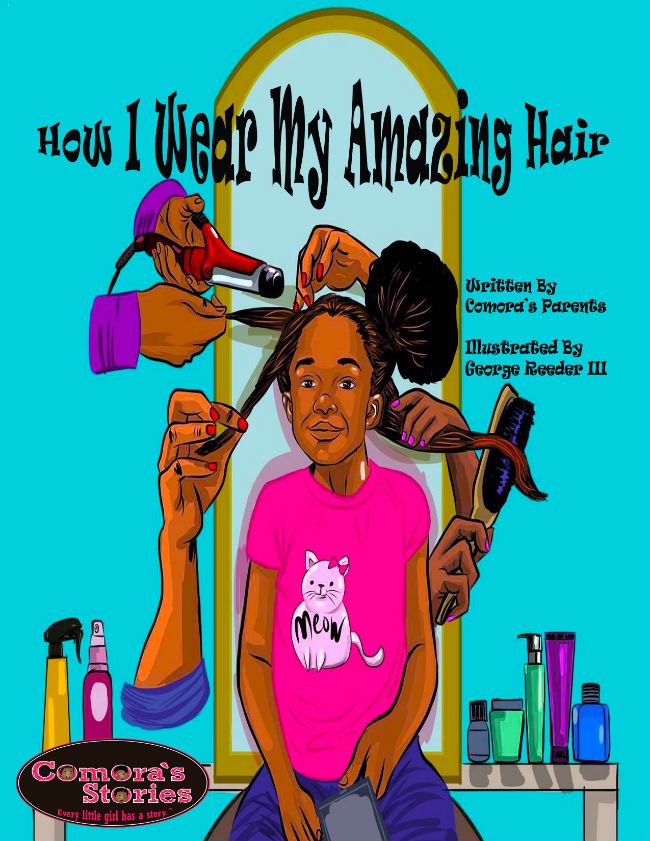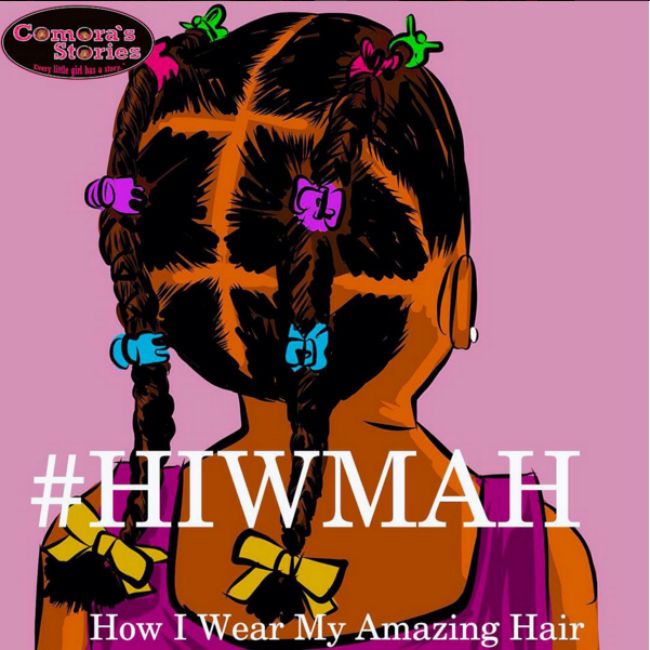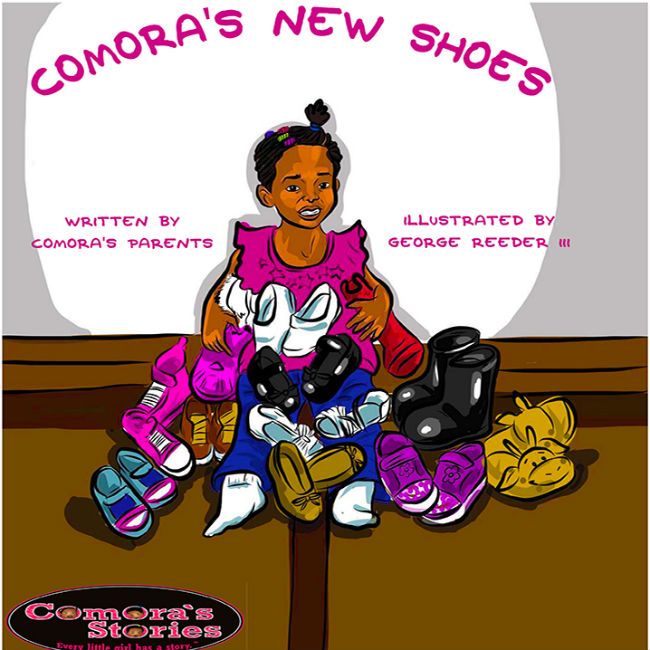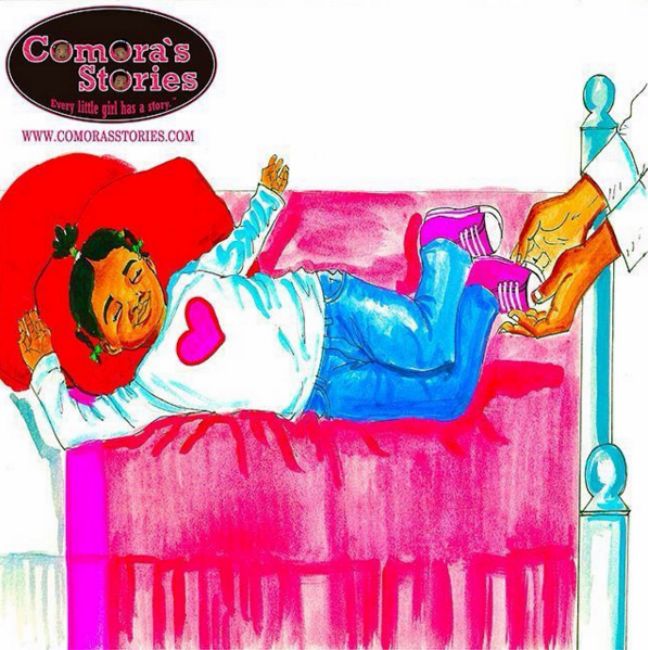Comora’s Stories is a series of children’s literature targeted toward young children of color. Many of the stories are inspired by Comora, a young girl living in Harlem, New York with her mom and dad. I recently spoke with the series creators, Cyrus Johnson and LaToya Johnson (Comora’s parents”>. Visit their site to purchase one their books on comorasstories.com, or follow @comorasstories.
Filling a void in the market
When Comora was born, we wanted her to love books as much as we do. Almost immediately, we noticed there wasn’t much on the shelves marketed toward children of color–especially girls of color.
Not to say there weren’t good books available, but they didn’t feature characters that looked like my daughter.
We decided to write our first book with the help of a family friend and amazing illustrator, George Reeder III, just for our own purposes. Once we saw the finished product and got rave reviews from everyone, we decided to share it with the world.
The Comora’s Stories series is personal on many levels for us. We want to share it with as many people as possible so that the onus of eliminating gender and ethnic bias in children’s literature isn’t just on us. There are many authors, parents and teachers doing this already, but we wanted to make our own contribution. If more parents start getting involved, I think we can affect some real change.
This world needs less labels.
When you have to go to a separate section or shelf in a store to see books that relate to you, a little part of you resents that and shuts down a bit. Maybe you don’t want to walk over there and get those books because it accentuates your “otherness”. The same thing happens online. People might be hesitant to click on something like books that are marketed toward them because it creates a sense of “we” vs. “they”. In real life it isn’t like that anymore, for the most part. There are no separate water fountains or train cars. But when kids pick up a book, they are transported back 60 years, which is sad. Less of that would be awesome in the future.
People might be hesitant to click on something like books that are marketed toward them because it creates a sense of “we” vs. “they”.
A good book should just be a good book, regardless of what the characters look like. We aren’t there yet, but if we make things more inclusive, before we know it there will just be books. Whatever you like, you’ll pick up and be comfortable. Less labels would be something we’d like to see more of.
Every little girl has a story.
Our motto and philosophy with the series is that every little girl has a story. What we’d like to convey is exactly that- every little girl does in fact have a story. Not just little white girls but girls of every other hue as well.
The overwhelming narrative in local and national bookstores doesn’t represent enough ethnic and gender diversity on the shelves to match what is actually happening in the real world.
The biggest thing we want to convey is that little black girls have the same experience as all other girls. It’s not always a struggle or an issue we are working through. Our first book, Comora’s New Shoes is about a little girl who begins walking and needs shoes. Every child who has feet can relate to that! The protagonist just happens to be a young black girl. It’s still a great story. That is just one example of what we can do.
Why Waterworks Won’t Work is yet another. What child doesn’t cry when they don’t get their way? Every scenario in the book is something that happens in real life-no matter what your race or gender is. When you read this book to children they aren’t going to care about the color of the child on the page. The message is what is going to resonate with the children.
We just wanted to showcase some of the styles and techniques that are popular among young girls of color with natural hair.
Our latest book, How I Wear My Amazing Hair is a book that celebrates the beauty of natural hair for young girls. It isn’t an “issue” book. It doesn’t address the stigma of natural hair vs. processed or “good” hair. There are many authors who have done a wonderful job with those subjects but we just wanted to showcase some of the styles and techniques that are popular among young girls of color. Young girls seeing themselves in their most natural and self actualizing state is a very empowering thing.
The response from the community has been really positive.
We are on our third book with the Comora’s Stories series. The momentum is steadily building. We have been navigating the learning curves of being new to self-publishing (and new authors”>. How I Wear My Amazing Hair has been extremely popular with the natural hair community. There is obviously some synergy there. We are working on getting our series in schools for kindergarten and elementary school grades. We think the Comora’s Stories series will do well in schools and that will be reflected in our community.
The inspiration for our stories
For Waterworks Won’t Work, I literally said, “your waterworks aren’t going to work with me, young lady” to my daughter. It was funny at the time, but then the proverbial lightbulb went off in my head. This was after the umpteenth time of her crying over no TV. or having to go to bed. It’s a delicate place with children and crying, because in our community when I was growing up, you never cried. No matter what. It wasn’t an acceptable form of self-expression. I didn’t want to convey that to my daughter, though. I wanted to be able to let her know it was OK to cry when nothing else will do. But when it’s not necessary, she definitely needs to use her words.
My current favorite books are Between The World and Me by Ta-Nehisi Coates–and virtually every word Chimamanda Ngozi Adichie has written. Chimamanda once gave a TED talk about the danger of one story-basically not letting one person or point of view control the narrative as it pertains to a group of people. Those two writers are in heavy rotation right now.
How to support Comora’s Stories
Our website, www.comorasstories.com, just went through a reorganization to make it more responsive for tablet owners so that is a great place to keep up with us and purchase our books. On our site you will also find a link to our merchandise shop via Spreadshirt.com. Our books are Available from Amazon and iTunes both in paperback or as digital downloads.
Libraries and academic institutions can go to Ingram Spark and place orders there. For social media, @comorasstories is how you can find us on Twitter, Instagram, Facebook, Tumblr and Pinterest. As always, we love to hear from fans at comorasparents@comorasstories.






